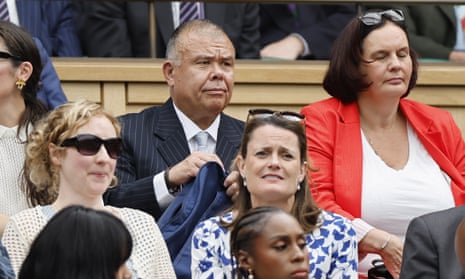Key events
Jonathan Van-Tam becomes adviser to vaccine maker Moderna
Sir Jonathan Van-Tam, the UK’s former deputy chief medical officer who became known for his sporting analogies during the Covid pandemic, has become a senior medical consultant to the Covid-19 vaccine maker Moderna.
Van-Tam, known as “JVT” during the pandemic, took up the role as part-time adviser to the American company in May, the Financial Times reported, citing official filings.
He was a member of the Vaccine Taskforce during the pandemic, which made decisions on vaccine supply contracts and investments in manufacturing and clinical opportunities.
A season-ticket holder at Boston United, the Lincolnshire team that plays in the sixth tier of the English football league, he often turned to soccer to find the words he wanted.
In late 2020, he told the BBC that in the early stages of the pandemic the “away team gave us an absolute battering” and that we had to hold our nerve and nick a goal back.
Van-Tam, a professor who was knighted in 2022, stepped away from his government role in March 2022 for a new role at the University of Nottingham.
At the time, the then health secretary, Sajid Javid, praised him for his unique approach to explaining crucial information to the public.
JVT’s one-of-a-kind approach to communicating science over the past two years has no doubt played a vital role in protecting and reassuring the nation, and made him a national treasure.

Rouble stable near two-week high at end of volatile week
The Russian currency has stabilised and is hovering close to a two-week high hit yesterday. It is set to gain more than 6% this week despite all the turmoil, with the market waiting for further measures from the authorities, such as capital controls.
On Monday, the rouble plunged through the 100 per dollar mark and was close to 102 at one stage, as markets fretted over the impact of western sanctions on Russia’s trade position. This prompted the Russian central bank to hike interest rates from 8.5% to 12% the following day, ostensibly to fight inflation, which is above its 4% target.
Since then, we’ve been waiting for further measures to prop up the rouble. Yesterday, Russian media and Bloomberg News reported that following a meeting between president Vladimir Putin and officials on Wednesday, the government was opting for an informal agreement to get exporters to surrender more of their foreign revenues.
The rouble is nearly 0.2% stronger at 93.6 per dollar. The authorities prefer a range between 80 and 90 per dollar.
Stock markets have opened lower again.
Germany’s Dax is down 0.5% at the opening bell, while France’s CAC and Italy’s FTSE MIB both fell 0.4% and Spain’s Ibex slipped 0.3%. The FTSE 100 index in London has lost 34 points, or 0.5%, to 7,274.
July’s weak retail performance pushed underlying three-month-on-three-month growth down to 0.1% from 0.4% in June.
Martin Beck, chief economic advisor to the EY Item Club, an economic forecasting group, said:
And with sales in July well below the second-quarter average, there appears to be a good chance that sales volumes could fall in the current quarter. But while the EY Item Club doesn’t think July’s particular weakness is wholly indicative of the outlook for retail, given the weather factor, subdued growth is likely to characterise the sector for the foreseeable future.
On the one hand, falling inflation and still-strong growth in cash pay mean average wages have finally started to rise again in real terms. Regarding price pressures, the latest retail release showed the annual rise in shop prices slowing to 4.3% in July, a 22-month low. Meanwhile, the financial position of households, in aggregate, is relatively healthy, reflecting unplanned savings accumulated during the pandemic and a paying down of unsecured debt in recent years.
But the impact of higher interest rates continues to build. An increasing number of households are reaching the end of fixed-rate deals and those re-mortgaging typically face a rise in monthly mortgage payments of several hundred pounds. And evidence of a cooling in the jobs market from rising unemployment and falling job vacancies mean that what has been a buttress to consumer spending is now looking less solid.
Toy sales benefit from Barbie bounce, says retailer
Gary Grant, founder and executive chairman of The Entertainer, a chain of toy stores he founded in 1982 with his wife, has been on BBC radio 4’s Today programme.
It is true to say that the weather has affected our summer sales and summer sales are performing below the levels that we would have expected for July and going into August.
But… we’ve got good stable products like squishmallows which have built up and built up and continue to expand as a collectible. We’ve got the benefit of a craze that’s really developing. Loom bands are back…
And then the industry’s benefited from some fantastic film releases, largely Barbie and the Turtles.
At the moment sales have increased on all Barbie items. But the bigger, more expensive priced items will sell as Christmas presents.
He said indoor sales such as stationery, craft items, puzzles and games had gone up, as parent tried to keep their children occupied at home during the rainy summer.
It is true to say that a lot of our families are under financial pressure from the cost of living crisis. But we have a lot of toys that start from from just a few pounds up to some of the more expensive items.

Food store sales volumes were 5.1% below pre-pandemic levels, the ONS said. People also bought less furniture and other big ticket items.
Non-food store sales fell by 1.7% in July, with retailers reporting that poor weather reduced footfall. Within that, household goods stores posted an even worse decline of 3.8% because of a fall in furniture and lighting products sales.
Department stores sales volumes fell by 2.9% over the month, while clothing stores posted a 2.2% drop.
According to the Met Office, it was the wettest July since 2009 and the sixth wettest July on record since 1836.
Helen Dickinson, chief executive of the British Retail Consortium, said:
July’s poor weather dampened retail sales, with spend stalling in areas such as clothing and footwear and household goods. Weakening consumer confidence also impacted purchases of big ticket items as customers continued to spend more cautiously, especially for computing and furniture. Meanwhile, sales for books and stationery performed better.
Retailers are hopeful that the coming months will provide a boost to spending, as England fans celebrate the Women’s Football World Cup Final this weekend, families start their back-to-school shopping and university students ready themselves for the new academic year. Nonetheless, the economic backdrop will remain difficult, and Government must find ways to create an environment that fosters economic growth.
Samuel Tombs, chief UK economist at Pantheon Macroeconomics, said:
July’s decline in retail sales likely is no more than a weather-related dip. Average temperatures swung from 2.7 degrees Celsius above their 1970-to-2022 average for the month of the year in June to 0.2 degrees below in July. Rainfall also was 78% above its 1970-to-2022 average in July.
Looking ahead, we continue to expect households’ real disposable income to rise briskly and to be about 2.0% higher in the fourth quarter than a year ago. Month-to-month increases in wages will outpace price rises in the third and fourth quarters, as energy prices fall back and the rate of increase in both food and core goods prices slows, in line with producer prices.
Mortgage refinancing will be a steady 0.2-to-0.3% per quarter headwind to quarter-on-quarter growth in households’ disposable incomes, and most of the drag will be offset at the aggregate level by an increase in the interest rate on the stock of households’ savings.
That said, some households likely will save more, given that the inflation-adjusted level of their bank deposits now is below the level implied by its pre-Covid rising trend, while others will focus more on paying off debt. In addition, consumers’ confidence still is well below its long-run average, despite recovering over the last six months.
All told, then, we think households’ real expenditure will be up around 1.5% year-over-year in the fourth quarter, with retail sales following a similar trend.
The Awful British Summer washed out retail sales in July
July UK retail sales -1.2% on month vs -0.5% expectations , -3.2% on the year
— Joumanna Nasr Bercetche 🇱🇧 (@CNBCJou) August 18, 2023
Introduction: Retail sales in Britain fall 1.2% as wet weather hits clothing purchases
Good morning, and welcome to our rolling coverage of business, the financial markets and the world economy.
Retail sales in Great Britain fell by 1.2% last month, more than expected, as people bought fewer summer clothes during the wet weather but also less food.
This was worse than the 0.5% drop forecast by economists. The sharp fall in July comes after a 0.6% monthly rise in retail sales volumes in June, which was revised down from 0.7%, the Office for National Statistics said.
Sales at food stores fell by 2.6% with supermarkets saying that people bought fewer clothes, as well as groceries. Retailers also indicated that the increased cost of living and food prices continued to affect sales volumes.
Shoppers switched to online shopping because of the bad weather and increased promotions, so 27.4% of sales were made online in July, up from 26% in June, and the highest proportion since February 2022.
Heather Bovill, deputy director for surveys and economic indicators, said:
The wet weather did mean a good month for online retailing, as discounting plus consumers shopping from the comfort of their homes boosted sales.
The Agenda











